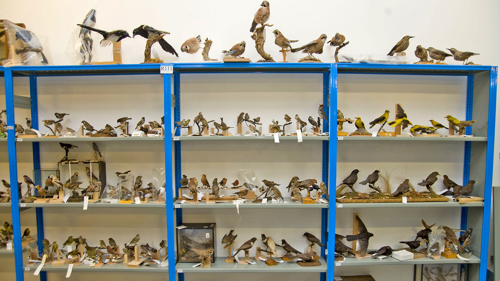Collection development

Glasgow City Council owns one of the greatest civic collections in Europe, containing over one million accessioned objects. Its size and diversity reflects the eclectic Victorian origins of the collections and over 160 years of collecting across the general subject areas of art, natural history, human history and transport and technology. The collection has both local and international significance. It portrays the history, culture and environment of Glasgow and the west of Scotland but also reflects their role on the world stage.
Collections Development Policy
The Collections Development Policy covers Acquisitions, Repatriation & Restitution, Spoliation, Loans Out and Disposal. It incorporates a summary of Glasgow Museums. Collection as it is currently and defines the areas where we wish to develop the collection. This policy document is currently under review.
The entire collection cared for by Glasgow Museums is a Recognized Collection of National Significance to Scotland. Therefore any new acquisition must meet the Museums Galleries Scotland Recognition guidelines in terms of importance and quality. We will only collect material where its authenticity can be demonstrated and which is fully provenanced. It must also be of sufficient importance to the appreciation, study and understanding of its subject to be recognised as of national stature. Priority will be given to collecting items which have associated contextual information such as documentation or personal testimony.
We will collect items which build on the existing strengths of the collection. This means that we will only acquire new material that increases the quality or significance of a collection area or makes a significant contribution to our understanding of the area and its context. Objects may be acquired specifically for the purposes of display, their use in learning and community engagement programmes or for their research potential. We will not acquire objects which duplicate our own collection or that of other public museums.
Glasgow Museums and Disposals - motivation and ethical context
Museums meet their responsibility to future generations by ensuring that collections are well managed and sustainable. In common with most museums around the world, appraisal, rationalisation and disposal forms an integral part of Glasgow Museums’ responsible collections management. This ensures that the collection remains sustainable and relevant for current and future audiences.
Glasgow’s museum, archive and library services operate within established legal and ethical frameworks which govern core operational practice in the sector. These include the codes of ethics of the Museums Association and the International Council of Museums. The Museums Association has developed a disposal toolkit which informs and provides the ethical framework for disposal. Standards for disposals are a key element of the UK Museum Accreditation scheme, governed by the Arts Council and Museums Galleries Scotland.
Glasgow Life reviews and updates its policies in line with these sector developments. The Collections Development Strategy incorporates the guidelines, policies and procedures contained with the Museum Accreditation standard.
In all cases rigorous criteria are applied by collection specialists to identify items for disposal and there is a transparent governance process for reviewing and risk assessing disposals.
Criteria for disposal
Glasgow Museums has adopted the collections rationalisation criteria set out in the Museums Association’s Disposal Toolkit Guidelines.
The criteria are that the:
- object no longer fits within the Museums Collecting Policy
- object unlikely to be used for display or research in next 10-15yrs
- object is more suitable for another Museum/Heritage service collection
- object is a duplicate (others have better provenance/contextual information/ stories)
- object is damaged beyond reasonable repair
- object poses a threat to health and safety
The following are also reviewed:
- Legal status of object (i.e., proof of ownership)
- Acquisition type (i.e., bequest, donation, Treasure Trove, fieldwork, transfer, purchase)
- Consultation needs (i.e., staff, communities, funders, donors, partnerships, contractual obligations, other stakeholders)
This process culminates in a recommendation for disposal which is submitted to Glasgow City Council for review and authorisation. Committee meetings can be viewed by the public via a web link and Committee Minutes are published and available online.
Following this approval, a list of disposals are published on the Museums Association website for about eight weeks to give accredited museums the opportunity to express interest in acquiring them. Thereafter the Museums Association Toolkit enables the following options:
- Contacting the original donor
- Transferring outwith the public domain, e.g. to educational or enthusiast groups/charities
- Recycling
- Landfill
A full audit trail of the process and outcome of the disposal is maintained by Glasgow Museums.
Disposal by sale
Glasgow Museums cannot undertake disposal motivated principally by financial reasons. Any funding accrued can only be used for collections management functions or new acquisitions.
Any proposal for disposal by sale requires to be assessed by the Museums Association Ethics Committee. In March 2015 a group of funding, membership and development bodies for UK museums reviewed their positions in respect of unethical sales culminating in a joint statement. This states that these bodies will not work with museums whose governing bodies choose to sell objects from their collections, where the sale would go against the UK Accreditation Standard and Museum Association Code of Ethics.
Further information
Email: museumcollections@glasgowlife.org.uk
Call: Glasgow Museums Resource Centre (GMRC) on 0141 276 9300
